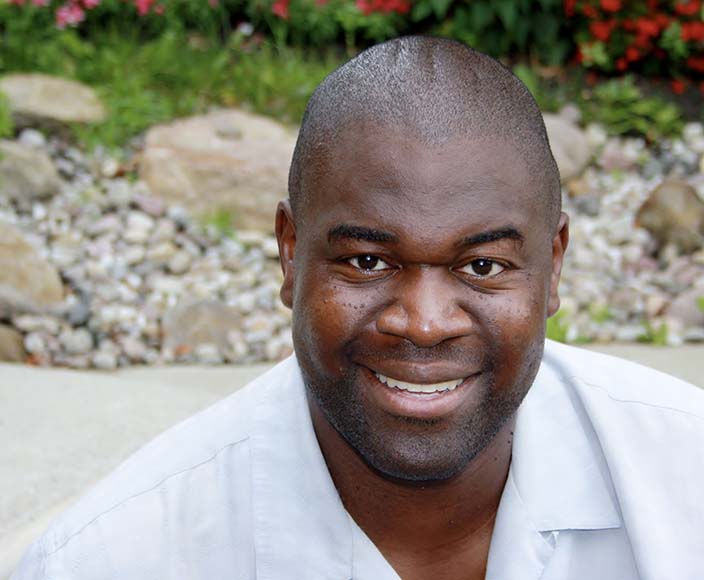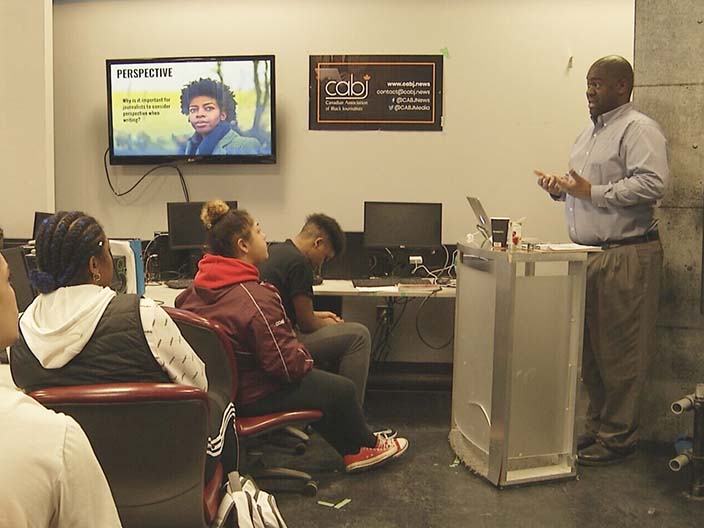Brian Daly’s very first day at King’s was last January as a casual instructor in the School of Journalism. He was teaching copy editing. It was, like all the other classes at the time, online. But for Daly, it was something special.
“It was exhilarating,” he says. “I loved preparing for teaching and I loved the teaching. I was in my element because I cut my teeth with The Canadian Press for the first seven years of my career and my course relies on the CP Style Guide.”
 Now Daly is an Assistant Professor in the school and along with teaching courses on copy editing, reporting and running the audio workshop he will help guide students in the one-year program through “bootcamp”—a series of intensive courses that provide an introduction to reporting, writing and editing the news. It’s a full plate.
Now Daly is an Assistant Professor in the school and along with teaching courses on copy editing, reporting and running the audio workshop he will help guide students in the one-year program through “bootcamp”—a series of intensive courses that provide an introduction to reporting, writing and editing the news. It’s a full plate.
“I’m driven by my passion for teaching more than anything,” he says, and then he starts to talk about the teaching he has done over his 26 years as a journalist—writing seminars, television production modules, computer-assisted reporting—he then explains where that passion comes from.
“Both my parents were passionate educators. My dad was orphaned at the age of five in inner city Montreal. Today he has three university degrees. My mom was a domestic when she immigrated from St. Vincent, faced incredible racism, but she earned two degrees from McGill.”
Education was paramount in the Daly household when he was growing up. But so was the news. Daly’s mother told him he was reading the Montreal Gazette by the time he was four. He doesn’t remember that, but he does remember this.
“One day, I would have been in elementary school, my Mom called me in to watch TV. It was on CBC and they had a Black woman as the anchor. That was the first time that had happened in Montreal. Her name was Omega Medina. My Mom wanted my brother and me to see someone who looked like us reading the news. It really jumped out at me and I started following the news even more closely.”
That led Daly to taking journalism courses at CEGEP. One of his teachers was Ernest Tucker, the first Black journalist at the CBC. Tucker wrote Daly a letter of recommendation that helped him get into Ryerson. From there it was print and broadcast, reporting and editing—Daly has done it all. But it may not have happened that way without the influence of people like Ernie Tucker and Omega Medina. Daly is now paying that forward with an initiative of the Canadian Association of Black Journalists (CABJ) called J-School Noire. Sponsored in part by King’s, the media camp for Black youth was first held in Halifax a month before the pandemic hit in 2020.
 “The whole plan was to present them with a six-hour program of journalism instruction with hands-on shooting and interviewing and finishing up with anchoring a live newscast and meeting mentors who would be with them throughout the year,” Daly explains. “It’s a chance for Black students to see if journalism is something they want to pursue. It’s impactful to see someone who looks like them in the business. It was the same for me.”
“The whole plan was to present them with a six-hour program of journalism instruction with hands-on shooting and interviewing and finishing up with anchoring a live newscast and meeting mentors who would be with them throughout the year,” Daly explains. “It’s a chance for Black students to see if journalism is something they want to pursue. It’s impactful to see someone who looks like them in the business. It was the same for me.”
But it hasn’t always been easy for Daly. He has encountered racism over his career. He tells the story of the time he was covering a court case in Montreal as a reporter. He had a note pad and a recording device in full view. A lawyer walked up to him and asked if Daly was his client.
“What people ‘see’ doesn’t jive with what I do. It’s the same when I’m covering sports. They’ll think I’m on the team before they would think I’m a reporter.”
There will be no mistaking Daly at King’s. He’s the guy at the front of the class with a wealth of knowledge and experience in Canadian journalism and the guy with life experience that will no doubt prove invaluable to a new generation of journalists.
“I am here as a teacher and journalist before being a Black man. But I am Black and proud to be so and I bring that into everything that I do. I believe it is important that people who come through King’s see a member of the Black community who can share experiences with them. I am also the son of an immigrant. That is important to making me who I am as a person. In the classroom maybe I can provide some personal experience to the students to help them understand how to interact with people who might look different but want to be accepted as human beings.”

